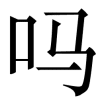Difference between revisions of "Language/Mandarin-chinese/Vocabulary/吗-ma"
< Language | Mandarin-chinese | Vocabulary
Jump to navigation
Jump to search
(→Uses) Tags: Mobile edit Mobile web edit |
m (Quick edit) |
||
| (8 intermediate revisions by 3 users not shown) | |||
| Line 1: | Line 1: | ||
[[File:吗-ma.gif|thumb | [[File:吗-ma.gif|thumb]] | ||
<div style="font-size:500%;">嗎/吗 (ma)</div> | |||
嗎/吗 (ma) is the interrogative final particle. | |||
==Uses== | ==Uses== | ||
嗎/吗 (ma) is one of the most common particles in Chinese. A particle goes on the end of a sentense. | |||
It is used to ask questions. | It is used to ask questions. | ||
The particle ''' | The particle '''嗎/吗''' is placed on the end of question which can only be answered with a “yes” or a “no”. | ||
==Examples== | ==Examples== | ||
* | *你餓嗎?/你饿吗? Nǐ è ma? | ||
Are you hungry? | <blockquote>Are you hungry?</blockquote> | ||
* | *你要去上海嗎?/你要去上海吗? Nǐ yào qù Shànghǎi ma? | ||
Are you going to go to Shanghai? | <blockquote>Are you going to go to Shanghai?</blockquote> | ||
* | *你是中國人嗎?/你是中国人吗? Nǐ shì zhōngguórén ma? | ||
Are you Chinese? | <blockquote>Are you Chinese?</blockquote> | ||
==Other particles== | ==Other particles== | ||
How to make the difference between 吧 (ba) and | How to make the difference between 吧 (ba) and 嗎/吗 (ma)?: [[Language/Chinese-mandarin/Vocabulary/吧-ba|The particle 吧 (ba)]] | ||
[[Category:Chinese- | ==How to write?== | ||
[[ | <youtube>5sFtes2KsN0</youtube> | ||
[[Category: Chinese-character]] | |||
==Other Lessons== | |||
* [[Language/Mandarin-chinese/Vocabulary/检(檢)-jiăn-examine|检(檢) jiăn examine]] | |||
* [[Language/Mandarin-chinese/Vocabulary/排-pái-row,-line|排 pái row, line]] | |||
* [[Language/Mandarin-chinese/Vocabulary/课(課)-kè-lesson;-class|课(課) kè lesson; class]] | |||
* [[Language/Mandarin-chinese/Vocabulary/国-guó|国 guó]] | |||
* [[Language/Mandarin-chinese/Vocabulary/Weather-and-Climate|Weather and Climate]] | |||
* [[Language/Mandarin-chinese/Vocabulary/领(領)-lĭng-lead;-head|领(領) lĭng lead; head]] | |||
* [[Language/Mandarin-chinese/Vocabulary/部-bù-part,-section|部 bù part, section]] | |||
* [[Language/Mandarin-chinese/Vocabulary/简(簡)-jiăn-simple|简(簡) jiăn simple]] | |||
* [[Language/Mandarin-chinese/Vocabulary/入-rù-enter|入 rù enter]] | |||
* [[Language/Mandarin-chinese/Vocabulary/Clothes|Clothes]] | |||
<span links></span> | |||
Latest revision as of 12:00, 25 March 2023
嗎/吗 (ma)
嗎/吗 (ma) is the interrogative final particle.
Uses[edit | edit source]
嗎/吗 (ma) is one of the most common particles in Chinese. A particle goes on the end of a sentense.
It is used to ask questions.
The particle 嗎/吗 is placed on the end of question which can only be answered with a “yes” or a “no”.
Examples[edit | edit source]
- 你餓嗎?/你饿吗? Nǐ è ma?
Are you hungry?
- 你要去上海嗎?/你要去上海吗? Nǐ yào qù Shànghǎi ma?
Are you going to go to Shanghai?
- 你是中國人嗎?/你是中国人吗? Nǐ shì zhōngguórén ma?
Are you Chinese?
Other particles[edit | edit source]
How to make the difference between 吧 (ba) and 嗎/吗 (ma)?: The particle 吧 (ba)
How to write?[edit | edit source]
Other Lessons[edit | edit source]
- 检(檢) jiăn examine
- 排 pái row, line
- 课(課) kè lesson; class
- 国 guó
- Weather and Climate
- 领(領) lĭng lead; head
- 部 bù part, section
- 简(簡) jiăn simple
- 入 rù enter
- Clothes
